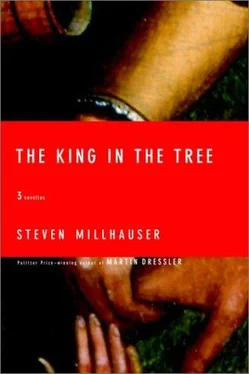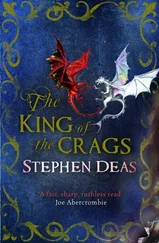And now my story’s done. I never dreamed I’d be so tired! But I wanted us to hear it. People don’t get to hear stories much anymore, and that’s a shame. Mine even has a moral, just the way a story should.
Tired. . I really am, you know. It takes it out of you, showing a house to strangers. And planning to go. . to some far-away place. A journey. . out of here. That would be nice. Peaceful, and. . nice. Don’t you think? I feel as if I haven’t slept for a long time. I haven’t, you know. I haven’t slept for nearly a year.
Remind me to show you the heating bills. I’ve got them all in some folder somewhere, going back ten years.
Here’s a question for you. If you were a ghost, if you were a ghost in this house, if you were dead and came to live in this house, where would you hide? In the attic? Or in the cellar?
Watch it. Watch your head.
Back from the dead. Oh, look: it’s dark out. Imagine.
Your coat. Have I said how much I admire it? I need a new spring coat myself, mine’s practically a rag. I’ll just put the porch light on for you. They say the weather’s going to be a little warmer tomorrow: sun mixed with clouds. Last time they said that, it rained for two days. I’m hoping my jonquils will pull through. I ought to tell you that someone’s coming to see the house tomorrow at four, or is it four-thirty: just for you to know. You think it over. Think over what we talked about, down there. I’m sure you’ll make the right decision. And I meant what I said about the appraisal: I won’t budge. Not a penny less, not a penny more. You let me know. I’ve lived here a long time, and now I don’t want to live here anymore. You let me know. You just let me know.
A time came when Don Juan could no longer bear his life. He was thirty years old, hot-blooded and handsome as a god, fiercely healthy except for a dueling scar on his left shoulder that troubled him a little in damp weather; when he walked the streets or the marble halls of still another city, the great plumes on his broad-brimmed hat trembled, his cape lifted behind him, and the jeweled hilt of his sword swinging in its scabbard against his leg seemed ready to leap out at the end of a blade of fire. He was an expert swordsman, a skilled horseman, a strong swimmer who once on a dare swam across the Ebro, where he ravished a handsome washerwoman before swimming back to complete the seduction of a countess. In his brief life he had bedded more than two thousand women and killed fourteen men — five in duels, eight in self-defense, and one by mistake, through a curtain at which he was thrusting in sheer high spirits. He feared no man, mocked the machinery of heaven, and was heard to say that the devil was a puppet invented by a bishop to frighten children in the nursery. Men envied him, women of stainless virtue stood in the window to watch him ride by. And yet this man, who walked the earth like an immortal, who did whatever was pleasing to him and who satisfied his every desire, felt that a darkness had fallen across his spirit.
Sometimes Don Juan had the sensation that every drop of his bright blood was being replaced by thick, dark smoke. Sometimes he felt tired in an unfamiliar way. He had had moments of tiredness before, the kind of bone-deep tiredness that comes after weeks of excess; then he would withdraw to his rooms, admitting no one but a devoted servant, only to emerge in two or three days, filled with energy and ferocious with desire, as if he wished to seize the world in his fist for breakfast. But this was no fit of sensual exhaustion, no temporary lull in the rush of his vigor. It was something else, something akin to tiredness that wasn’t tiredness — as if a little crack, like a tiny flaw in crystal, had appeared deep within him and begun to spread. He was not bored. Don Juan didn’t know whether he loved women, but he knew that he loved the pursuit and conquest of women, loved the feeling that he was following pleasure to the farthest edges of his nature. No, he felt restless in some other way, dissatisfied deep in his blood; and he began to feel that he was looking for something, though he didn’t know what it was, exactly, or where he might find it.
He had planned to stay in Venice for a week or two, but he had remained for nearly a year. What bound him was the shimmer of the place, the sense of a world given over to duplication and dissolution: the stone steps going down into the water and joining their own reflection seemed to invite you down into a watery kingdom of forbidden desires, while the water trembling in ripples of light on the stone facades and the arches of ancient bridges turned the solid world into nothing but air and light, an illusion, a wizard’s spell. It was a fragile, trembling world that might vanish at any moment — and perhaps that was the secret of the feverish life that began at night, when women wearing the masks of wolves and birds of prey beckoned from passing gondolas, while torchlight rippled in the black water and dark figures disappeared into doorways. Venetian women were out for pleasure, and Don Juan had bedded so many of them that he sometimes had the sense that Venice was an immense brothel composed of watery corridors and floating bedrooms hung with murky mirrors and paintings of swooning women ravished by centaurs. At other times, leaning back against the cushions of his gondola, gliding under stone balconies along narrow, sinister canals that suddenly opened into broad waterways alive with crowds on bridges, pleasure parties in gondolas, the tremor of jewels in torchlight, laughter and music everywhere, and now and then an ambiguous cry, perhaps of a young girl being thrown down in a doorway or a man being stabbed in a crooked alley, it seemed to Don Juan that he knew exactly where he was: he was on the black, fiery lake he had seen one day in a church fresco, a priestly vision of the damned that he, Don Juan Tenorio, who in a moment would step into the gondola of a woman wearing the mask of a leering satyr, preferred to call A Vision of Paradise.
Here conquest had been easy — perhaps too easy. Although not every Venetian woman was by profession a whore, the kinds of resistance he had encountered were, with a few refreshing exceptions, entirely conventional and perfunctory. A married woman who set out with the intention of giving herself to the notorious Don Juan would lower her eyes, turn her face to one side to avoid a full kiss, and push away the hand resting on her carefully half-bared breasts; sometimes tears of remorse would form in eyes already clouding over with desire. Under such easygoing conditions Don Juan, who liked nothing better than overcoming a fierce resistance, by force if necessary, found himself contriving difficulties that Venetian society failed sufficiently to provide. He would abduct a woman and lead her blindfolded and weeping to a room so dark that she could not see his face; he would frighten willing victims with a show of rage, so that their bodies stiffened and he had to possess them brutally. Sometimes he disguised himself as a gondolier, or a humble glassblower, or a Greek sailor in a red cap. In order to animate the game, he occupied not only a fashionable palazzo on the Grand Canal, but also a modest set of rooms in a mean alley, in always shifting decors intended to support the role he happened to be playing. That sense of playing a part began to exasperate him, and deepened his mood of discontent; even when he reverted to Don Juan, his legend trailed after him like a heavy velvet cloak. One black-eyed beauty had asked him whether it was true that a famous street in Seville was populated entirely by women who had given birth to his bastards. Don Juan, confirming it with a bow, wondered if it might be true.
Читать дальше












